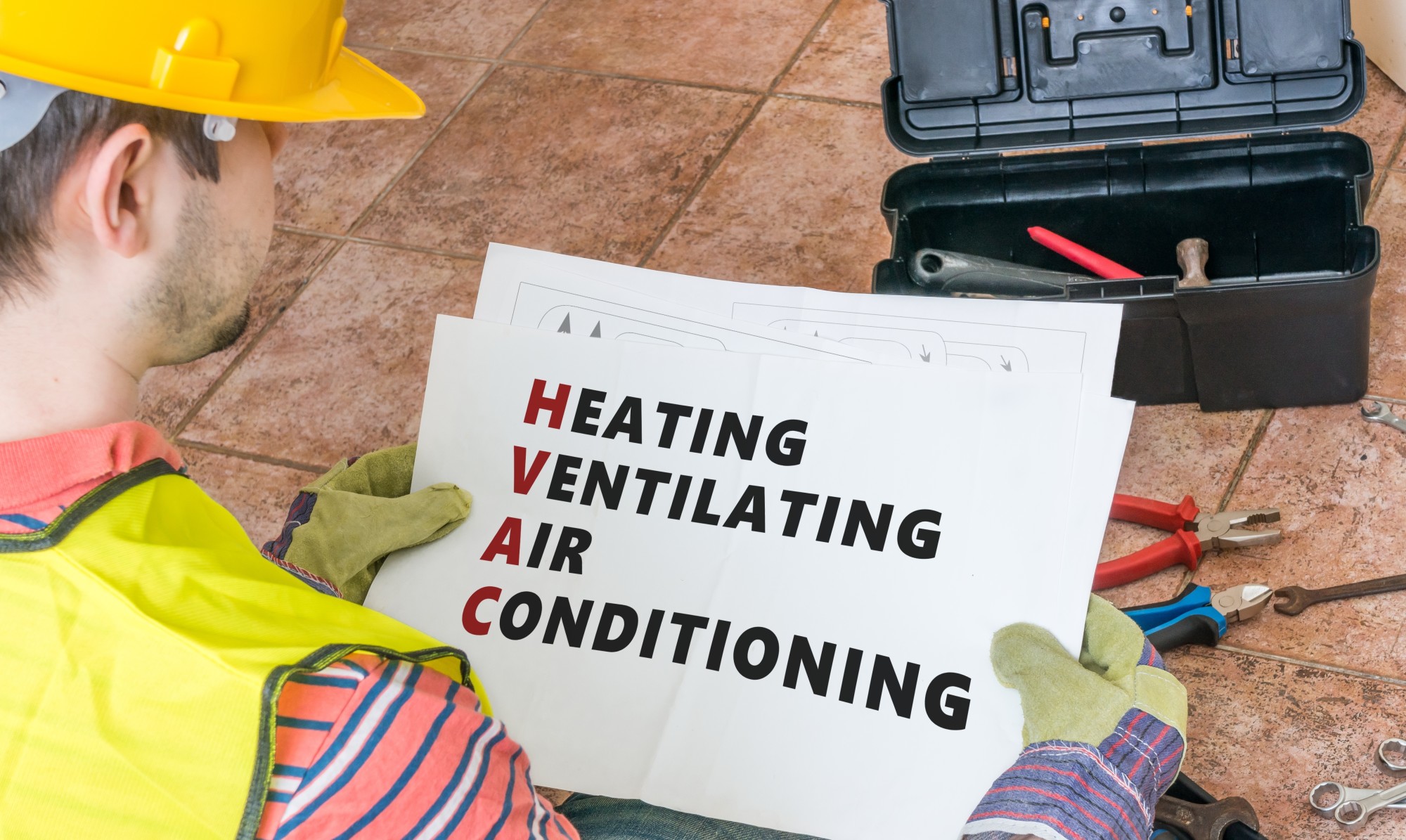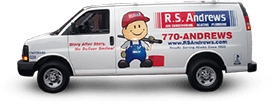HVAC Retrofitting Services: Commercial and Residential Retrofit Installations
Discover unparalleled HVAC retrofit installations with R.S. Andrews, serving the Greater Atlanta area, Savannah, and Hilton Head since 1968.
What sets us apart:
- Decades of smiles and satisfaction since 1968
- The Smiley Advantage Plan
- Guaranteed satisfaction and transparent pricing
- Advanced diagnostics with infrared inspections
Contact R.S. Andrews today for trusted HVAC installations in Atlanta, Georgia.
What is HVAC Retrofitting?
HVAC retrofitting services involve updating your current heating, ventilation, and air conditioning (HVAC) systems to boost energy efficiency and indoor air quality. This process can include installing new components like air economizers, which use outdoor air for cooling, reducing reliance on air conditioning. Other enhancements may involve energy recovery ventilation (ERV) systems that recapture energy from exhaust air and demand control ventilation (DCV) systems that adjust airflow based on occupancy levels. By consulting with a professional HVAC retrofitting contractor in Atlanta, you can determine the most effective retrofits for your system, ensuring optimal performance and energy savings.
What do HVAC retrofitting services include?
An HVAC retrofitting service from a reputable company includes a comprehensive evaluation of your existing system, followed by installing advanced components to improve efficiency. Services may cover:
- Adding or upgrading air economizers for “free cooling”
- Implementing ERV to minimize energy loss
- Installing DCV to adjust ventilation based on actual need
- Upgrading to smart building automation systems for better control
- Routine maintenance to ensure long-term efficiency
These strategic retrofits enhance system performance and contribute to significant energy and cost savings, demonstrated by successful projects in schools and public buildings across the country.
Benefits of HVAC Retrofitting
Retrofitting your HVAC system offers numerous advantages, particularly for enhancing energy efficiency in both commercial and residential settings:
- Retrofitting your HVAC system offers numerous advantages, particularly for enhancing energy efficiency in both commercial and residential settings:
- Significant heating and cooling performance improvements lead to a more comfortable indoor environment.
- Reduced energy consumption, translating to lower utility bills.
- A boost in system efficiency.
- Installation of modern components that contribute to better air quality and more precise temperature control.
- Cost-effectiveness in extending the lifespan of your HVAC system while optimizing energy use and improving indoor comfort.
Signs that You Need Retrofit Installations for Your HVAC
Knowing when to opt for retrofit installations in your HVAC system is crucial for maintaining optimal energy efficiency and comfort. Signs indicating the need for a service retrofit include:
- Inconsistent temperatures or difficulty maintaining set temperatures, indicating poor performance.
- Drafts or uneven heating and cooling affect comfort.
- Increased energy bills or spikes in energy usage that are not explained by weather changes
- Frequent illnesses or discomfort, such as coughs, headaches, or dizziness, are potentially caused by poor indoor air quality.
- Noticeable system noise, which points to aging equipment.
- Equipment over 15 years old, suggesting it’s nearing the end of its effective lifespan.
These symptoms suggest your HVAC system may require a retrofit to ensure reliable, energy-efficient heating, cooling, and ventilation.
Energy-efficient Retrofit Installations (Types)
Energy-efficient retrofit installations enhance HVAC systems, improving air quality and reducing energy costs. Key types include:
- Air Economizers: Leverage cooler outdoor air for ventilation and reduce reliance on air conditioning through “free cooling.”
- Energy Recovery Ventilation (ERV) Systems: Optimize efficiency by recycling energy from exhaust air and minimizing the energy needed for conditioning incoming fresh air.
- Demand Control Ventilation (DCV): Adjusts airflow based on occupancy and ensures air quality while conserving energy.
- Building Automation System (BAS): Provides precise control over HVAC operations and facilitates smarter, energy-saving decisions and maintenance practices.
Ductwork Retrofitting
Ductwork retrofitting refers to the updating and modification of your home’s existing HVAC duct system. This process can include sealing leaks, adding insulation, adjusting the system layout, or installing new components to improve airflow and efficiency. The goal is to optimize the duct system to better distribute air throughout the home, enhancing the overall performance of the HVAC system.
Why is Ductwork Retrofitting Necessary?
Retrofitting is necessary for several reasons:
- Improved Comfort: It ensures consistent temperatures across all rooms, eliminating hot or cold spots.
- Increased Energy Efficiency: Retrofitting minimizes energy loss by reducing leaks and improving insulation, leading to lower utility bills.
- Enhanced Indoor Air Quality: Properly sealed and insulated ducts prevent dust, debris, and pollutants from entering the system and circulating through your home.
- System Longevity: An optimized duct system reduces strain on your HVAC equipment, potentially extending its lifespan.
In essence, ductwork retrofitting is a cost-effective way to upgrade your home’s heating and cooling system without needing a complete overhaul, providing immediate benefits in comfort, energy savings, and air quality.
Consider our professional ductwork retrofitting services to ensure your home reaches its peak comfort and efficiency levels. Call R.S. Andrews at (770) 674-8996 to discuss how we can enhance your HVAC system’s performance through targeted ductwork improvements in Atlanta, GA. Let us help you achieve a more comfortable, energy-efficient home today.
Why Choose R.S. Andrews as Your Heating, Ventilation, and Air Conditioning (HVAC) Retrofitting Company?
Selecting R.S. Andrews for your HVAC retrofitting needs guarantees a partnership with a leader in energy-efficient solutions. Our expertise in high-impact retrofits, from air economizers to advanced ventilation and control systems, ensures your HVAC operates at peak efficiency. With a commitment to reducing energy costs and improving indoor air quality, we tailor retrofit solutions to meet your specific needs. Our team’s dedication to excellence, coupled with the use of sophisticated control systems and routine maintenance, positions us as the ideal choice for optimizing your HVAC system. Trust R.S. Andrews to deliver superior retrofitting and energy-efficient HVAC installation services, enhancing comfort and sustainability in your space.
FAQs about HVAC Retrofits
1. Can HVAC retrofits help reduce my energy bills?
Yes, HVAC retrofits are designed to enhance the energy efficiency of your system, leading to lower energy bills. By updating components like air economizers and incorporating ERV and DCV systems, retrofits make your HVAC system use energy more wisely. This means your system works better with less energy, saving you money in the long run.
2. How do I know if my HVAC system is a good candidate for a retrofit?
The best way to determine if your HVAC system can benefit from a retrofit is to consult professional HVAC contractors. They can assess your current system’s age, condition, and performance. Generally, systems that are outdated but not too old or those experiencing inefficiency or increased repair needs are good candidates for retrofitting.
3. What’s the difference between HVAC retrofitting and replacement?
Retrofitting involves upgrading parts of your existing HVAC system to improve its efficiency and performance without completely replacing it. This can include installing new components or updating the controls. Replacement means removing your old system and installing a new one. Retrofitting is often more cost-effective if your system is fundamentally sound but needs an efficiency boost.
4. How long does an HVAC retrofit take, and will it disrupt my daily activities?
The duration of an HVAC retrofit can vary depending on the complexity of the installations and upgrades. However, HVAC contractors aim to minimize disruption to your daily activities. Most retrofits can be completed within a few days, and contractors will work with you to schedule the retrofit at the most convenient time. Maintenance and repair during the retrofit process are also planned to ensure minimal interruption and quick completion.






